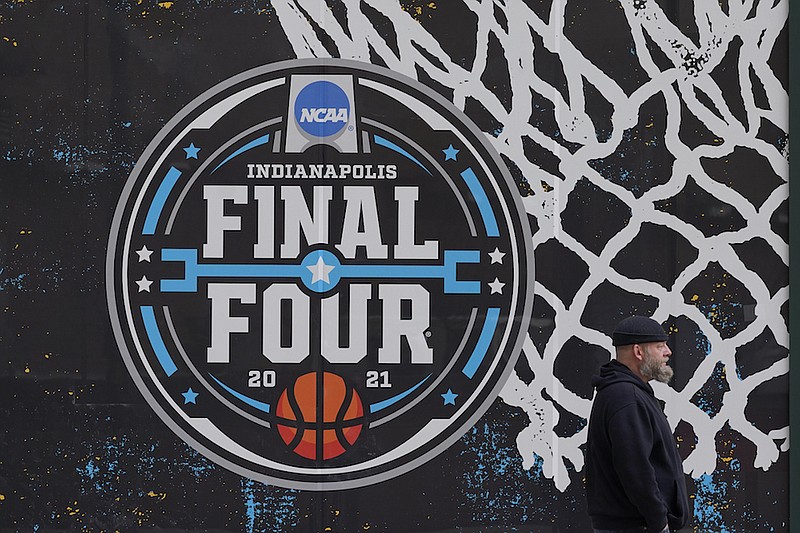Monday night brought a conclusion to the most important annual financial event the NCAA stages - its Division I men's basketball tournament.
Even in this COVID altered season, even with the original 68 teams placed in a "bubble" at the tourney's beginning, even with the dramatic limiting of fans and regardless of which team - Gonzaga or Baylor - wound up owning the most air time in the "One Shining Moment" video at the close of Monday's title game, the NCAA is always the tourney's biggest winner.
The vast majority of its $1.1 billion annual operating budget comes from tournament revenue, especially the television contract, which is worth more than $10 billion over the next decade.
Yet Monday night may have also been the last night for years that the NCAA in particular, and college athletics in general, finds any peace.
Or as University of Tennessee at Chattanooga athletic director Mark Wharton noted Monday afternoon, "Sitting here as a FCS (Football Championship Subdivision) school, looking at everything being pushed by Power Five Conference schools such as Name, Image and Likeness (NIL), the cost of attendance we've already gone through, the inequities brought up by the women between the men's and women's tournaments, it's concerning."
It's a mess, and most of it should be laid directly at the feet of NCAA President Mark Emmert, who couldn't be more inept if he were Mayberry's fictional Barney Fife.
In fact, Charles Barkley actually referred to Fife during a televised rant about the NCAA in the middle of March Madness, saying, ""Man, the NCAA, they are like the Barney Fife of the world. They do an awful job of administrating. We've got guys on tape paying players three years ago (that) they ain't said nothing about. It's time for them to get their (act) together."
Actually, that time was decades ago. But with everything around them moving faster these days, the sloth speed at which the NCAA responds to any issue only makes this worse.
Back to Wharton, who can't believe that the NCAA couldn't see fit to make sure the workout facilities, hotel accommodations, food options and goody bags for the men's and women's players during their twin tourneys were equal in quality, or at least strongly approaching equal.
"It's such a behemoth organization," said Wharton, "and they handled that so poorly. The leadership should treat all student-athletes fairly, give each of them the best experience possible. What does a championship look like to a women's team compared to a men's basketball championship? We talk about that all the time with our Southern Conference tournaments."
Apparently there's not much communication between the NCAA men's and women's championships. So Emmert failed again, just as he does about every time he opens his mouth, continually on the wrong side of history, or at least common sense.
And because of that, on the hugely important upcoming Supreme Court ruling regarding the NCAA versus Alston case alone - which is expected to frame how far the Name, Image and Likeness issue can go in terms of compensating athletes - expect the NCAA to lose yet another court ruling, this one likely to do longterm damage to mid-major programs such as UTC and quite possibly every other school below the Power Five leagues.
"If (the athletes win the legal case), it will affect us," said Wharton. "We'll have to hire another compliance person to monitor how it's handled. I think you're going to see another round of schools cutting sports, maybe even dropping football. You're seeing a lot of older athletic directors retire this year because they probably don't want to have to deal with all this."
All of this is more than merely trying to navigate the NIL issue, which will have athletes attempting to profit on their athletic accomplishments while still in college. Theoretically, they'll be able to do advertisements, endorse products, maybe even stage their own summer sports camps.
Call me a cynic, but they'll basically be paid over the table what they've long earned under the table through handshakes with boosters and phony summer jobs such as watering artificial turf fields. Heck, this might actually be better. Maybe they'll really do something to earn all that money.
Still, to return to Barkley's observation, the FBI investigation into college basketball should have already placed, if their charges are proven true, no fewer than four programs - LSU, Arizona, Kansas and Auburn - on serious probation.
And all of this is happening under the dark shadows of a coronavirus pandemic that may or may not be behind us by this time next year.
Said Wharton using similar words to health officials and others, "I think it's at least two years before we're even close to normal."
And by then, if the NCAA loses its Supreme Court case, the new normal may look nothing like the old normal. It might not even include college sports as we've long known them.
Contact Mark Wiedmer at mwiedmer@timesfreepress.com
